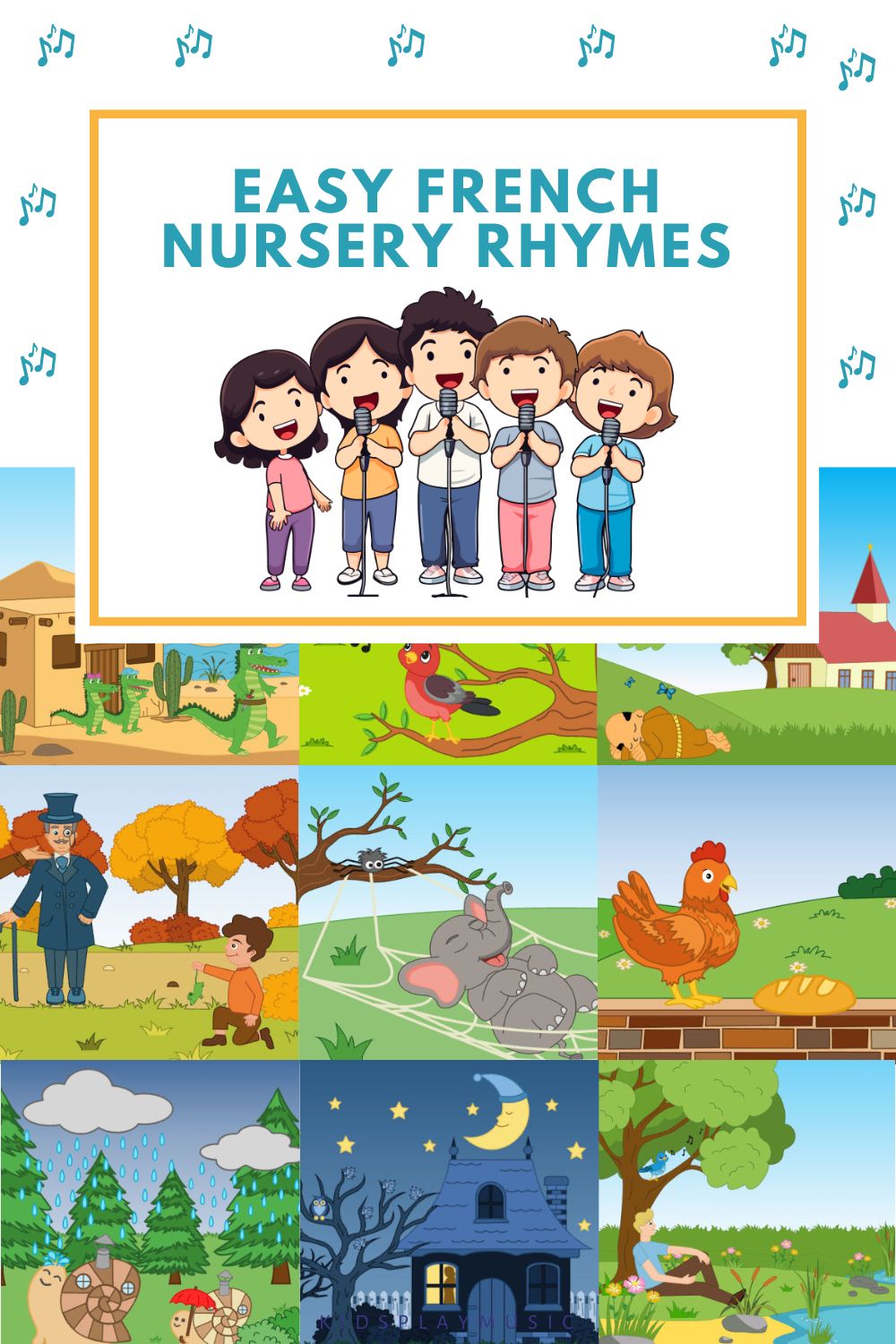Although there are countless children’s songs in English, there are at least as many children’s songs to discover in other languages too. If children grow up speaking French or are learning French at school, nursery rhymes are perfect for motivating and encouraging them to learn. And songs in foreign languages are also generally very suitable for introducing them to the diversity of our language world.
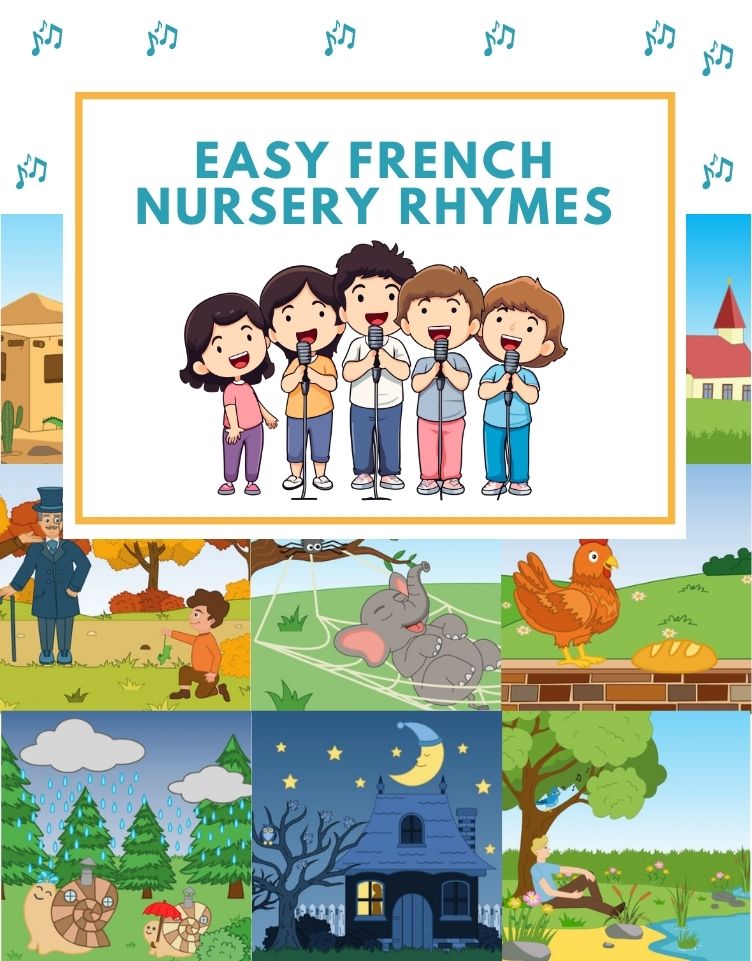
French culture has made it beyond its national borders in many areas and it is a similar story with some classic French children’s songs. For example, the world-famous nursery rhyme Frère Jacques (English: Brother John or Are you Sleeping) comes from France and is not only known in its original form, but has also been translated into numerous languages outside Europe, including China and South Africa! Other well-known French nursery rhymes include Sur le pont d’Avignon, Au Clair de la Lune and Alouette.
French Children’s Songs explained and translated
In addition to the well-known songs, there are also other nice French rhymes to discover. In the following, we would therefore like to introduce you to some rather unknown children’s songs in addition to the internationally known ones. We will also briefly present the story behind each children’s song, if it is known. The focus is of course on the original lyrics and the English translation.
1. Frère Jacques

Let’s start with the best known and simplest French nursery rhyme: Frère Jacques (English: Brother John). The song is probably so well-known and popular worldwide because it is so short and memorable. Strictly speaking, this is a canon. Canons are songs in which two or more voices enter into the same melody at a certain interval. Each voice is identical, but the individual voices sing at different times. Frère Jacques is often one of the first songs that children learn on a musical instrument because it is easy to play.
The song Frère Jacques was written by Jean-Philippe Rameau in the 18th century. The song is about a monk who is asleep and is asked to ring the bells. This monk is called Jacques in French.
Frère Jacques, Frère Jacques !
Dormez-vous, dormez-vous ?
Sonnez les matines,
sonnez les matines !
Ding, Dang, Dong ! Ding, Dang, Dong !
Are you sleeping? Are you sleeping?
Brother John, Brother John.
Morning bells are ringing!
Morning bells are ringing!
Ding, dang, dong! Ding, dang, dong!
2. Au Clair de la Lune
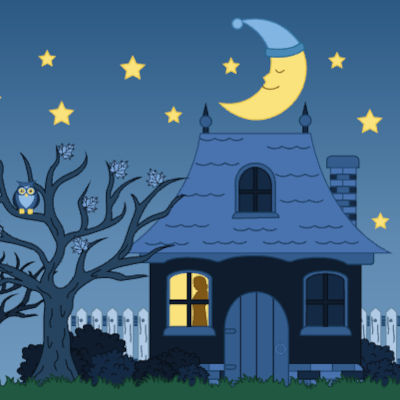
A very well-known French children’s and folk song is Au Clair de la Lune (English: By the light of the moon). The song has a very catchy melody and is often sung by parents as a lullaby. Thanks to the low pitch range, this song is also often used in instrumental lessons. It consists of a total of 4 verses, although often only the first verse is sung. In terms of content, it is about love and desire and is actually more of a song for adults. Over time, however, the song has established itself as a lullaby.
The author of the song is unknown and the composer is not clearly documented, but the melody is often attributed to Jean-Baptiste Lully in some sources.
1. Au clair de la lune,
Mon ami Pierrot,
Prête-moi ta plume
Pour écrire un mot.
Ma chandelle est morte,
Je n’ai plus de feu ;
Ouvre-moi ta porte,
Pour l’amour de Dieu.
2. Au clair de la lune,
Pierrot répondit :
« Je n’ai pas de plume,
Je suis dans mon lit.
Va chez la voisine,
Je crois qu’elle y est,
Car dans sa cuisine
On bat le briquet. »
3. Au clair de la lune,
L’aimable Lubin
Frappe chez la brune,
Elle répond soudain :
— Qui frapp’ de la sorte?
Il dit à son tour :
— Ouvrez votre porte
Pour le dieu d’amour!
4. Au clair de la lune,
On n’y voit qu’un peu.
On chercha la plume,
On chercha le feu.
En cherchant d’la sorte,
Je n’sais c’qu’on trouva ;
Mais je sais qu’la porte
Sur eux se ferma…
1. By the light of the moon,
my friend Pierrot,
lend me your quill
to write a word.
My candle is dead,
I have no light left.
Open your door for me
for the love of God.
2. By the light of the moon,
Pierrot replied:
“I don’t have any quill,
I am in my bed.
Go to the neighbor’s,
I think she’s there
because in her kitchen
someone is lighting the fire.”
3. By the light of the moon
likeable Lubin
knocks on the brunette’s door.
She suddenly responds:
– Who’s knocking like that?
He then replies:
– Open your door
for the God of Love!
4. By the light of the moon
one could barely see.
The pen was looked for,
the light was looked for.
With all that looking
I don’t know what was found,
but I do know that the door
shut itself on them.
3. Ah les Crocodiles

The song Ah les Crocodiles (English: Ah the crocodiles) is also a very popular children’s song, which tells the story of a crocodile who goes to war with his comrades on the Nile against the elephants. Because of that, he has to say goodbye to his family and children. When they meet the elephants, however, they flee back into the Nile. The song has been around since at least 1860 and originally comes from the musical Tromb-al-ca-zar ou les Criminels dramatiques by Jacques Offenbach. There are therefore numerous variations and versions of the children’s song.
1. Un crocodile, s’en allant à la guerre
disait au revoir à ses petits enfants
trainant ses pieds, ses pieds dans la poussière
il s’en allait combattre les éléphants.
Refrain:
Ah ! Les crocrocro, les crocrocro, les crocodiles
sur les bords du Nil,
ils sont partis n’en parlons plus.
2. Il fredonnait une marche militaire
Dont il mâchait les mots à grosses dents.
Quand il ouvrait la gueule tout entière
On croyait voir ses ennemis dedans.
Refrain:
Ah ! Les crocrocro, les crocrocro, les crocodiles
sur les bords du Nil,
ils sont partis n’en parlons plus.
3. Un éléphant parut et sur la terre
Se prépara ce combat de géants.
Mais près de là, coulait une rivière
Le crocodile s’y jeta subitement.
Refrain:
Ah ! Les crocrocro, les crocrocro, les crocodiles
sur les bords du Nil,
ils sont partis n’en parlons plus.
1. A crocodile, it goes to war,
said goodbye to his little children,
dragging his feet, his feet through the dust,
it goes to fight the elephants.
Refrain:
Ah! the crocro-cro, the crocro-cro, the crocodiles
on the banks of the Nile, they’re gone,
we don’t talk about them anymore.
2. He warbled a military march
and chewed the words straight out.
With its open mouth
you thought you could see your enemies inside.
Refrain:
Ah! the crocro-cro, the crocro-cro, the crocodiles
on the banks of the Nile, they’re gone,
we don’t talk about them anymore.
3. An elephant appeared and on land
this gigantic battle was about to begin.
But a river flowed nearby,
and the crocodile suddenly threw himself into it.
Refrain:
Ah! the crocro-cro, the crocro-cro, the crocodiles
on the banks of the Nile, they’re gone,
we don’t talk about them anymore.
4. À la claire Fontaine

The song À la claire Fontaine (English: By the clear fountain) is a traditional French song. There are several indications for the origin of the song. One theory is that the song was composed by a juggler. According to another theory, it was composed by one of the first travelers to Canada. In any case, it is based on an anonymous poem written between the 15th and 18th centuries.
The song is very well known and popular in France, but also in the Canadian province of Québec. À la claire Fontaine was sung by riders on long canoe trips and by patriots during the 1837-1838 uprisings against English hegemony. It was the first national anthem of New France and there are around 500 different versions of the song! Depending on the version, the song tells of the misfortune and sadness of a young man or woman who has been rejected.
1. À la claire fontaine
m’en allant promener
j’ai trouvé l’eau si belle
que je m’y suis baigné.
Refrain:
Il y a longtemps que je t’aime
jamais je ne t’oublierai.
2. Sous les feuilles d’un chêne
je me suis fait sécher
sur la plus haute branche
un rossignol chantait.
Refrain:
Il y a longtemps que je t’aime
jamais je ne t’oublierai.
3. Chante, rossignol, chante
toi qui as le cœur gai
tu as le cœur à rire
moi, je l’ai à pleurer.
Refrain:
Il y a longtemps que je t’aime
jamais je ne t’oublierai.
4. J’ai perdu mon amie
sans l’avoir mérité
pour un bouquet de roses
que je lui refusai.
Refrain:
Il y a longtemps que je t’aime
jamais je ne t’oublierai.
5. Je voudrais que la rose
fût encore au rosier
et que ma douce amie
fût encore à m’aimer.
Refrain:
Il y a longtemps que je t’aime
jamais je ne t’oublierai.
1. At the clear fountain
when I went for a walk
I found the water so beautiful
that I bathed in it.
Refrain:
I have loved you for a long time,
I will never forget you.
2. under the leaves of an oak
I dried myself.
A nightingale sang
on the highest branch.
Refrain:
I have loved you for a long time,
I will never forget you.
3. sing, nightingale, sing.
You who have a cheerful heart,
you have the heart to laugh,
but I have it to weep.
Refrain:
I have loved you for a long time,
I will never forget you.
4. I lost my girlfriend
without having earned her
because of a bouquet of roses,
which I refused to give her.
Refrain:
I have loved you for a long time,
I will never forget you.
5. i wish the rose was
still on the rose bush
and that my sweet friend
still loved me.
Refrain:
I have loved you for a long time,
I will never forget you.
5. Petit Escargot
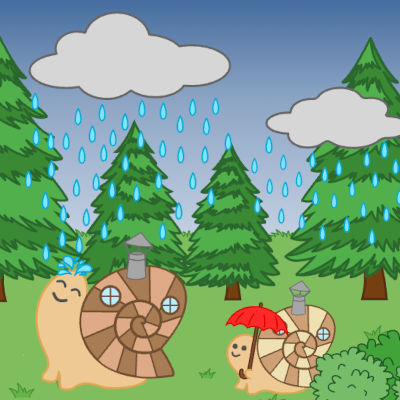
Petit Escargot (English: Little snail) is one of my favorite songs in French. The song is generally very popular because it is very short and can therefore be easily remembered by small children. It consists of just two sentences. It also has a very catchy melody that is almost like an earworm.
Unfortunately, the author and the history of the song are not known. In any case, it is not only a beautiful song to sing, but also to accompany on an instrument. It should be at the top of your list if you play music with children and are looking for a French song.
Petit escargot
porte sur son dos
sa maisonnette.
Aussitôt qu’il pleut,
il est tout heureux,
il sort sa tête
Little snail
carries its little house
on its back
As soon as it rains,
it is very happy,
sticks its head out.
6. Dans la Forêt lointaine
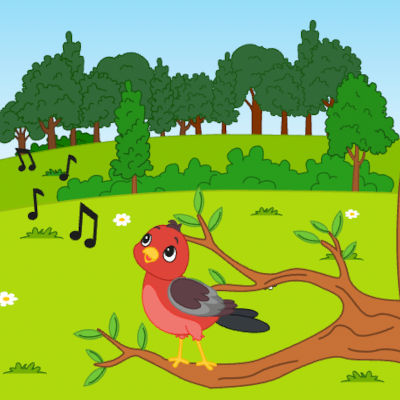
Dans la Forêt lointaine (English: In the distant forest) is a pretty nursery rhyme for young children. Unfortunately, neither the author nor the composer of the song are known. Therefore, not much is known about its history.
The song features an owl and a cuckoo singing in the forest. The children’s song is very short and fun to sing. Young children in particular enjoy singing it, as the song also involves imitating the cuckoo.
Dans la forêt lointaine
on entend le coucou.
Du haut de son grand chêne
Il répond au hibou:
Coucou hibou, coucou hibou
Coucou hibou coucou.
Coucou hibou, coucou hibou
Coucou hibou coucou.
In the distant forest
you can hear the cuckoo.
From his high oak
he answers the owl:
Cuckoo Owl, Cuckoo Owl
Cuckoo, Cuckoo, Cuckoo.
Cuckoo Owl, Cuckoo Owl
Cuckoo Owl Cuckoo
7. Une souris verte
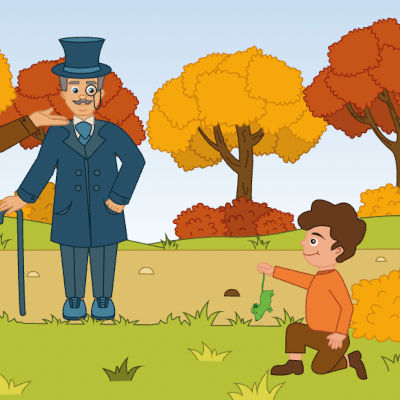
Une souris verte (English: A green mouse) is a traditional French song that is not only known in France, but also in almost all French-speaking countries such as Tunisia, Haiti and Belgium. There are several variations for the ending of this song and unfortunately the original version of the song is not known.
The song seems to date from at least the late 17th or early 18th century. Unfortunately, there is no information about the composer or the author of the text. Nevertheless, there are some sources that attempt to interpret the content of the song. The green mouse is said to be an allusion to a soldier from the Vendée who was a member of the Catholic and royal army during the Vendée Rebellion between 1793 and 1795. This soldier would have been hunted down by the Republican soldiers during this war. The expression that he was a “hot snail” could be interpreted to mean that he was tortured.
1. Une souris verte
qui courait dans l’herbe.
Je l’attrape par la queue,
je la montre à ces messieurs.
Ces messieurs me disent :
“Trempez-la dans l’huile,
trempez-la dans l’eau,
ça fera un escargot tout chaud.”
2. Je la mets dans un tiroir,
elle me dit qu’il fait trop noir.
Je la mets dans mon chapeau,
elle me dit qu’il fait trop chaud.
Je la mets dans ma culotte,
elle me fait trois petites crottes.
1. A green mouse,
running around in the grass.
I grab it by the tail,
I show it to the masters.
The masters say to me:
“Dip it in oil,
dip it in water,
that makes a warm snail.”
2 . I put it in a drawer,
it tells me it’s too dark.
I put it in my hat,
it tells me it’s too hot.
I put it in my underpants,
it makes me three little piles.
8. Une Poule sur un Mur
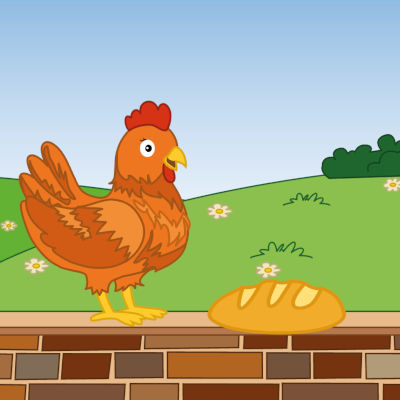
Une poule sur un mur (English: A chicken on a wall) is a French children’s song that is not as well known as some other songs. However, it is also a good song for beginners who are learning a musical instrument such as the guitar or piano.
It is very short and therefore memorable and quick to learn. The song actually consists of just one sentence. It is about a chicken that likes to peck bread off a wall. Unfortunately, neither the origin nor the author of this nursery rhyme is known.
Une poule sur un mur
qui picore du pain dur,
picoti, picota,
lève la queue
et puis s’en va.
A chicken on a wall
pecking at hard bread,
picoti, picota,
raises its tail
and walks away.
9. Un Éléphant qui se balançait
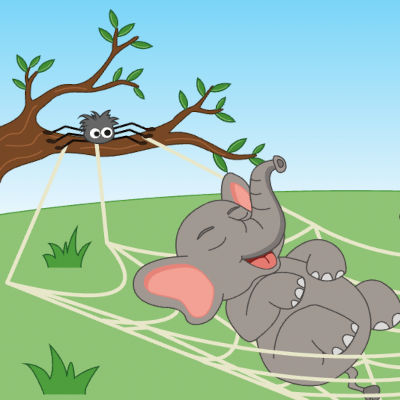
Un Éléphant qui se balançait (English: One elephant was swinging) is a good children’s song for young children to learn numbers and counting. Unfortunately, neither the origin nor the author of the song is known. This children’s song is about an elephant swinging on a spider’s web. Because it’s so much fun, he doesn’t stay alone and one elephant after another joins him. So there is a verse for every elephant that arrives on the spider’s web until the spider’s web finally breaks.
It’s a pretty short verse, but you can continue singing the next verses with the second and third elephants until the spider web breaks.
Un éléphant qui se balançait
sur une toile, toile, toile,
toile d’araignée.
Il trouvait ça tellement, tellement amusant
qu’il alla chercher un deuxième éléphant.
An elephant swings
on a web, web, web,
spider’s web.
He thought it was so funny
that he got himself a second elephant.
10. Au Feu les Pompiers

Au Feu les Pompiers (English: Fire, firemen) is a very good nursery rhyme for young children as it is quite short and simple. It is about the fire department and most children are fascinated by the fire department. The song is about a house burning and the person denies that they are responsible for the fire. Instead, it is said to have been the canteen lady or the canteen manager.
Unfortunately, the author and the history of the song are not known. In any case, the nursery rhyme is not as old as many other traditional songs, e.g. Frère Jacques or Au Clair de la Lune.
Au feu, les pompiers,
v’là la maison qui brûle.
Au feu, les pompiers
v’là la maison brûlée.
C’est pas moi qui l’ai brûlée,
c’est la cantinière!
C’est pas moi qui l’ai brûlée,
C’est le cantinier!
Fire, firemen!
The house is on fire.
Fire, firemen,
There’s the burning house.
It wasn’t me who set it on fire,
it was the canteen lady!
It wasn’t me who set it on fire,
it was the canteen owner!
